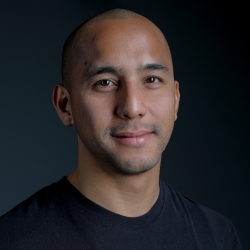
Albert de la Tierra
This biographical sketch is for current/prospective students and potential community partners who want to learn more about my work at SF State. For a holistic view of who I am, please visit my personal website: https://professor-lobo.com/.
I am a sociologically-trained interdisciplinary scholar with 10+yrs teaching experience. My scholarly research aims to explain how lived experiences connect to structures of power. As an educator, I strive to develop students’ critical thinking by tailoring coursework to their backgrounds and interests. Across all social settings, I intend to ameliorate underrepresentation and promote inclusivity.
I earned my Ph.D. and M.Phil. in Sociology from The Graduate Center at the City University of New York (CUNY) and B.A. in Criminology, Law & Society (with concentration in Psychology and Social Behavior) from the School of Social Ecology at the University of California, Irvine. I completed advanced certificate training in The Psychology of Leadership (Cornell University), Critical Theory (CUNY), and Women's Studies (CUNY). I am a certified Community Counselor (Southern California Counseling Center at Watts) and certified Peer Support Specialist (California Mental Health Services Authority).
With 10+ years teaching experience at diverse urban universities, I am dedicated to responding to distinct learning needs to achieve equitable success outcomes. I view human differences—demographic as well as psychographic differences—as valuable resources for higher education. My course assignments focus on cultivating analytical thinking and mastering communication skills.
Prior to my arrival at SF State, the courses I taught at the John Jay College of Criminal Justice and Hunter College had titles such as: Gender and Masculinities, Theories of Social Order, Introduction to Sociology, and Qualitative Research Methods. This teaching experience informs my sociological approach to the courses I regularly teach at SFSU: CJ 200: Construction of Crime and Justice, CJ 300: Criminal Justice: A Cross-Disciplinary Perspective, CJ 452: Criminological Theory, CJ 600: Youth Gangs in Community Context, and CJ 680: Field Course in Criminal Justice.
A critical ethnographer, I employ qualitative methodologies and radical theories of gender, race, and class to unearth connections between lived experiences and structures of power. My scholarship disrupts pathologizing narratives by employing inclusive epistemologies that amplify subjugated knowledges.
My current research aims to understand and ameliorate men’s mental health disparities at the intersection of racialization, marginalized masculinities, and carceral governance. Specifically, my works in progress provide sociohistorical context for the cultural study of marginalized masculinities by highlighting protective mental health resources found in communities of color with implications for promoting health equity in US urban environments.
You can find my CV and all of my scholarship on my academia.edu page: https://albertdelatierra.academia.edu/. Below is an abridged list of my publications that may be of interest to potential community partners and students who are thinking about enrolling in one of my classes:
- de la Tierra, A. (2025). Social justice in the name of ____: Cultivating abolitionist visions of justice with project-based learning. Sociology of Race & Ethnicity, 11(1), 100-115.
- de la Tierra, A. (2023). Settler colonial governance and the impossibility of a "good cop." In M. O. Craig & K. L. Blount-Hill (Eds.), Justice and Legitimacy in Policing: Transforming the Institutions. Routledge.
- de la Tierra, A. (2020). Carceral calisthenics: (Body) building a resilient self and transformative reentry movement. In K. M. Middlemass & C. J. Smiley (Eds.), Prisoner Reentry in the 21st Century: Critical Perspectives of Returning Home. Routledge.
- de la Tierra, A. (2016). Essentializing manhood in "the streets": Perilous masculinity and popular criminological ethnographies. Feminist Criminology, 11(4), 375-397.
I am available to all San Francisco State University students during my scheduled office hours. Please come say hello! I’d love to chat with you about your career/academic plans.
My approach to undergraduate mentorship aims to create inclusive scholarly environments that center racial equity and cultivate a sense of belonging among historically excluded student populations. I utilize my role and positionality to empower BIPOC students’ self-conception as active contributors to the profession.
Specifically, I mentor and write letters of recommendation for undergraduate students who work closely with me on extracurricular activities. For example, I am excited to mentor undergraduate researchers who intend to publish with The Annual Review of Criminal Justice Studies, collaborators who want to organize professional on-campus events, and students who want to join my all-star team of teaching assistants.
My approach to graduate supervision prioritizes intellectual freedom and professional autonomy. I view masters and doctoral students as emerging subject matter experts, and use my supervisory role to serve and support them as colleagues. I am not a gate-keeper and oppose academic hazing rituals; I believe done is better than perfect.
I currently supervise graduate students at SF State and other institutions. Assuming ideological alignment, theoretical affinities, and epistemological parallels, I am available to serve additional graduate student colleagues as a reader or committee member. I am currently not available to serve as committee chair. I am currently not hiring graduate research assistants.
Focused on ameliorating underrepresentation and promoting inclusivity across all professional domains, I strive to create knowledge-sharing communities intent on fostering a more equitable society both within and beyond academia. By promoting mutual respect and understanding, I embrace interdisciplinary collaboration and build relationships between SF State and community organizations in government, non-profit, and educational sectors. Concretely, I have successfully partnered with diverse stakeholders to organize symposia, colloquia, film screenings and discussions, workshops, and recruitment events.
In 2025, I intend to collaborate with three community organizations to design and deliver a Community Service Learning (CSL) course. CSL is a high-impact pedagogical practice where student learning outcomes benefit the common good through direct service to communities in need or the organizations that serve them. Having learned a bit about me in the sections above, if you are a representative of a mission-, vision-, and values-aligned community organization please reach out; I want to build with you!